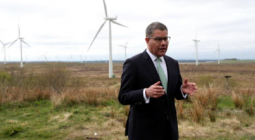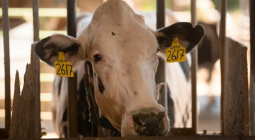World first: malaria vaccine rollout begins in Cameroon
Another 19 African countries have plans to join the programme – bringing ‘more than just hope’ to a continent that suffers the vast majority of malaria deaths
The rollout of the world’s first malaria vaccine began in Cameroon on Monday, which is said to be a “transformative chapter in Africa’s public health history”.
The RTS,S vaccine – 662,000 doses of it – will be administered to children in the west African country, the first to be vaccinated after successful trials of the drug in Ghana, Kenya and Malawi between 2019 and 2021.
It marks a scaling up of the fight against malaria in Africa, where 95% of deaths from the disease occur, most among children under five.
“We are not just witnessing but actively participating in a transformative chapter in Africa’s public health history,” said Dr Mohammed Abdulaziz, the division head at the Africa Centres for Disease Control and Prevention, headquartered in Ethiopia, at a joint online briefing with the World Health Organization. “For a long time we have been waiting for a day like this … it brings more than just hope, it brings a reduction in the mortality and morbidity associated with malaria.”
Public health experts say communication with the public will be crucial to the vaccine’s success – to ensure that it is trusted, that people bring their children back for all four doses, and that people understand it will be most effective when combined with other measures, such as sleeping under insecticide-treated bed nets.
“We need messaging, we need communication, and we need to use trusted voices,” said Abdulaziz. “We need to use health workers who are very close to the community. We need to listen to the community, to what they are saying and also monitor how we are being received.”
Kate O’Brien, the director of the WHO’s immunisations and vaccines department, said that based on the trial data, RTS,S – also known as Mosquirix – would saves tens of thousands of lives.
Another 19 African countries plan to introduce the vaccine this year, with hopes that 6.6 million children could be reached. Deliveries are due for Burkina Faso, Liberia, Niger and Sierra Leone.
Mbianke Livancliff, from the Cameroon nonprofit Value Health Africa, said there has been excitement in the country since the vaccines were delivered in November. The organisation has held community meetings and open discussions to introduce people to the vaccine and its approval process, to deal with people’s concerns and stave off any potential hesitancy.
“It has been an exciting moment. Families are excited, they are happy to have this major development and they are saying this is effective and this is what we have been waiting for,” Livancliff said.
In the Cameroon city of Douala, at the private Angels Clinic, six-month-old Nobah Adel screamed as she was scratched by the needle administering her first dose of the vaccine on Monday morning.
“Even if she cries, I’m very happy today,” said her mother, Dani Widal, who heard about the vaccine campaign a week ago. “I have three children and all are always sick with malaria. I hope that the vaccine will finally help her not to be sick like her brother and her sister.”
Widal had queued with her daughter for three hours to get the vaccine. “I live in a neighbourhood where there are a lot of mosquitoes. I spend more than 30,000 francs [£39] every three months because of malaria.”
Kamela Isabelle Madjouwou, a nurse at the centre, said a malaria vaccine was “essential”. Cameroon recorded more than 6m cases in 2022 and malaria accounted for 12% of deaths among children under five in 2021. “The vaccine will reduce mortality and the consequences of this terrible disease,” she said.
Thomas Breuer, the chief global health officer at GlaxoSmithKline, which produced the vaccine said it was a significant development: “After more than 35 years of dedicated work with our partners to develop the world’s first malaria vaccine, Mosquirix, it’s rewarding to see it in routine use for the first time. We’re excited that more malaria-endemic countries are preparing to introduce the vaccine over the coming months.”
A second malaria vaccine, R21/Matrix-M, produced by the University of Oxford, is due to be rolled out later this year.
Cover photo: By The Guardian





